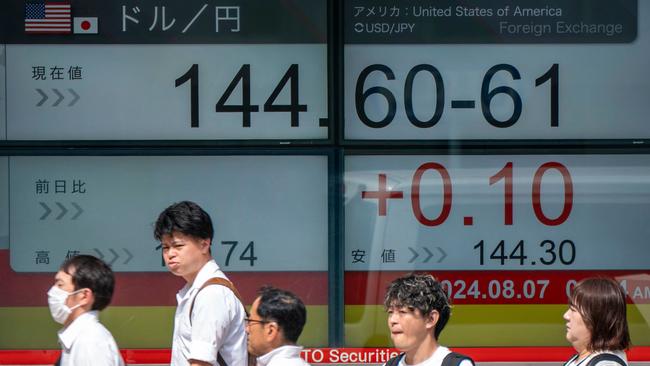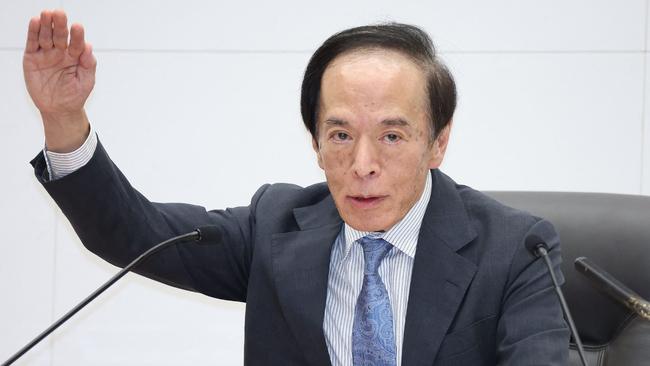Markets hitched to yen carry trade and that has some concerned
Despite bargain hunting in stocks this week, global markets continue to be driven by the outlook for the short Japanese yen ‘carry trade’ – and that’s not healthy.

Business
Don't miss out on the headlines from Business. Followed categories will be added to My News.
Global markets have hitched themselves to the Japanese yen and that’s not exactly healthy.
No doubt there has been some cautious bargain hunting in stocks this week but in reality global markets continue to be driven by the outlook for the short Japanese yen “carry trade”.
While magnified by US recession fears – which have been allayed for now – the volatility and massive de-risking globally that came as the yen soared from four-decade lows in recent weeks only highlighted the magnitude of this carry trade and what a rapid unwind can do to risk assets.
These moves show that it’s just as much of a risk as it was during the Global Financial Crisis.
After holding Japanese interest rates around zero for the past 15 years, even as Western central banks increased rates at the fastest pace in decades to deal with the inflation outbreak of the pandemic, the Bank of Japan last week hiked to 25 basis points.
Governor Kazuo Ueda seemed hellbent on further rate rises, saying that Japan was “a long way from achieving a neutral interest rate”.
At the same time the Federal Reserve has signalled that it plans to soon start cutting US rates.
Of course the outlook for risk assets is much better than it would have been if US recession fears had been borne out in the ISM Services report on Monday. However, markets will be nervously watching US data in the month ahead, particularly the next non-farm payrolls report on September 6.
On that front, while the 10-year US Treasury yield rose on Tuesday because of a weak Treasury bond auction, the US 10/two year Treasury spread is a whisker from turning positive after being negative for years.
A re-steepening of the curve after a significant period of inversion is a reliable signal of recession, even though there’s limited support for that in the economic data.
Predictably dovish comments from a BoJ deputy governor Shinichi Uchida helped arrest the fall in the US dollar/yen exchange rate on Tuesday after it plunged 12 per cent in less than four weeks, contributing to a damaging 25 per cent off the high-flying Nikkei 225.
But Japanese and US monetary policy interest rates are expected to converge by about 2.25 percentage points over the next year or so. Even if the US doesn’t face a recession in the near future, the Japanese yen no longer looks like a one-way bet and that spells trouble for the carry trades.
According to Citi, the interest rate spread and risk-reward balance for the short yen carry trade haven’t yet met the conditions prevailing in the past when US dollar yen entered a downtrend.

“However, intervention to buy the yen by the Japanese government since 2022 has caused a change in underlying supply/demand and may therefore have accelerated the peak for the US dollar yen,” Citi Global Markets Japan research director Osamu Takashima said.
Moreover, the US dollar/yen may be “vulnerable to increasing downside scope over the passage of time”.
“We see the recent fall as only the beginning of the end,” Mr Takashima said.
He said the direct trigger was intervention to buy the yen conducted by the Japanese government on July 11 and 12, and the recent movement in US dollar/ yen “suggests this is happening again now”.
“In the past, there has tended to be a sustained uptrend in the currency pair once the interest rate spread has widened to more than around 5 per cent, even if there is no further increase beyond that,” Mr Takashima said.
“One important reason will be that the broad short-term interest rate spread promotes the yen carry trade and consequently means yen depreciation.”
On the other hand, when the interest rate spread falls below around 4.75 per cent, the performance of US dollar/yen tends to abruptly worsen.
“This is because the unwinding of yen carry trade puts strong upward pressure on the currency,” Mr Takashima said.
“We have for some time been wary of the risk of such unwinding of yen carry while focusing on this threshold level of the interest rate spread.”
Based on the outlook for Fed and BoJ monetary policy, Citi had expected the spread to fall below this threshold in December this year, but last week’s hike by the BoJ and the decline in US interest rates following the weak employment data may have brought this timing forward to around September.
“If our hypothesis is correct, it would not be surprising if the turning point in the trend came early,” Mr Takashima said.
According to JPMorgan, the broader yen carry trade, estimated at $US4 trillion ($6 trillion), has likely seen only “limited unwinding”.
“The so-called yen carry trade has been so big in size that if inflation induces further BoJ rate hikes in the future, there would be more unwinding of the yen carry trade over the medium term,” JPMorgan head of global derivatives strategy Nikolaos Panigirtzoglou said.
“The combined effect of rising US recession risk and unwinding of the broader Japanese yen carry trade triggered a correction in risk assets, in particular equities and a rally in safe assets such as government bonds, the yen and Swiss franc.”
Despite the recent correction, equities allocations at the global level were significantly above average levels, Mr Panigirtzoglou said.
Originally published as Markets hitched to yen carry trade and that has some concerned



